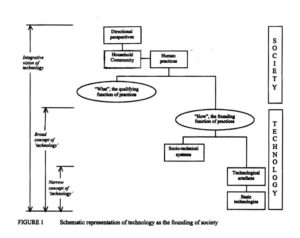Social Change In Our Technology-Based World. Festschrift for Dr. Sytse Strijbos
No comments yet Introduction
Introduction
The following text was written as an introduction to the proceedings of the annual conference of the Centre for Philosophy, Technology, and Social systems, an international and interdisciplinary research cooperation cofounded by Strijbos. The chief motive for the inclusion of this text in this Dr. Sytse Strijbos Festschrift is to provide the reader with a short illustration of the kind of thinking that occupied Strijbos, and the research collaboration that he coestablished and governed.
Integrative framework
With slight exaggeration, one can say that change is the only constant factor in today’s society, where everything is in flux – continuing change seems to be a basic condition for living in modern times. These extreme dynamics and fluidity of society (Bauman 2000) have been directly related to the complex of Science, Technology, and Economy since the Industrial Revolution of the 19th century in Europe. In past decades, the study of this complex has become a vast field of interdisciplinary research with many ramifications and approaches (see e.g., the Encyclopedia of Science, Technology and Ethics.)
To understand social change in a technology-based society first requires a conceptualization of the main terms “technology” and “society”. One should realize, however, that both terms are container concepts or collective names and do not refer to a specific object. Furthermore, one must be aware that by distinguishing between such a thing as “technology” on the one hand and “society” on the other, one might already start from a false view of technology, namely, as something separate from society. Aiming for an integrative vision of technology and society, one should consider that technology is about people and thus a part of society, not unlike a meteorite that impinges from outside on our human lives and society. “We know that technology does not determine society: it is society. Society shapes technology according to the needs, values, and interests of people who use the technology.” (Castells and Cardoso 2005: 3)
Figure 1 provides a schematic of an integrative vision, in which the lower part of the diagram represents “technology” and the upper part “society.” In everyday language, technology usually refers to material artifacts, such as a cell phone, car, or laptop. Usually, we are unaware that each of these artifacts is, for its functioning, dependent on a comprehensive system, for example, to use a car, a system of roads, petrol stations, legal regulations, and numerous other amenities required. Characteristic of modern science-based technology is that a fundamental transition has taken place in the relation between technology  and society, namely, from technology that consists of separate artifacts in the hands of individuals to technology as a total environment in which we live. This new relationship between technology and society concerns the “how” or foundation of the various human and social practices in which our daily life unfolds. These practices have become dependent on their realization of organized “sociotechnical systems,” such as transportation from the mobility system, medical support from the health care system, and schooling and training from the educational system. The transition from a traditional to modern society thus goes along with a fundamental and irreversible change of our living environment. Technology has become a new habitat for people, a technotope.
and society, namely, from technology that consists of separate artifacts in the hands of individuals to technology as a total environment in which we live. This new relationship between technology and society concerns the “how” or foundation of the various human and social practices in which our daily life unfolds. These practices have become dependent on their realization of organized “sociotechnical systems,” such as transportation from the mobility system, medical support from the health care system, and schooling and training from the educational system. The transition from a traditional to modern society thus goes along with a fundamental and irreversible change of our living environment. Technology has become a new habitat for people, a technotope.
This fundamental transition to a modern technological world also has profound implications for the economic sphere of society and politics. Referring to Figure 1, one could observe that the sociotechnical systems that provide the foundation for societal life in its variety of practices also include the economic and political dimension, for example, the health care system. Since about the 1980s, the economy of health care has become a recurring matter of public debate. Notably, the traditional ethical relationship of medical practice between physician and patient has been dyadic. This situation has changed profoundly because this relationship is intertwined within a broader nexus in which several other parties are involved. This means, among other things for the physician, that their obligations to each patient must be balanced in a network of competing obligations and conflicting interests (see e.g. Haavi Morreim 1991).
Let us now turn our attention to “society” at large, the upper part of Figure 1. Through the centuries, the household has been the fundamental building block of human society – within the household and family is where the exchange between the generations and their care for each other takes place. The fabric of society around the household has fundamentally changed since the rise of the Industrial Revolution. As long as the household as the fundamental unit of society persists, a broad range of human practices has gradually differentiated from the household, a process that began with the organization of labor and technical production in factories. The challenge for social change in a modernizing society can now be understood as the dual task of preserving the household as the ethical core of society and opening up the household and the potential of the various human practices for the benefit of society. This means that the shaping of the “how,” the technical-organizational foundation of society, should enable concretization of the specific “what” of each domain of human life along with the sustenance of healthy households in society.
It is difficult to ignore that peoples’ behavior patterns vary among regions and distinct cultural backgrounds. The role of culture and religion is therefore a hotly debated topic, in particular, the debate related to the economic development of a society. In recent years, the debate has been triggered by the study Culture matters: How values shape human progress (2000), edited by Harrison and Huntington, and some later publications. In the scheme of Figure 1, the role of culture and religion for the development of our technology-based societies is accounted for by “directional perspectives.” Traditionally, the household and local community play key roles in the transfer of basic cultural values, formation directional perspectives on human life, and communication about the world from one generation to the next. In a differentiated society, human practices must play a complementary role in the transfer of specific values, or echoing MacIntyre (1981: 178), in developing and maintaining the so-called “internal good”’ of these practices.
References
Bauman, Zygmunt. (2000). Liquid modernity. Cambridge: Polity Press.
Castells, Manuel and Cardoso, Gustavo, eds. (2005). The Network Society: From Knowledge to Policy. Washington, DC: Johns Hopkins Center for Transatlantic Relations.
Haavi Morreim, E. Balancing Act: The New Medical Ethics of Medicine’s New Economics. (1991). Dordrecht: Kluwer.
Harrison, Lawrence E and Huntington, Samuel P, eds. (2000). Culture Matters: How Values Shape Human Progress. New York: Basic Books.
MacIntyre, Alasdair. (1981). After Virtue: A Study in Moral Theory. London: Duckworth.
Mitcham, Carl, ed. Encyclopedia of Science, Technology and Ethics, (2005). Vol. 1-4. Farmington Hills: Thomson Gale. 29
Strijbos, Sytse and Basden, Andrew, eds. (2006). In Search of an Integrative Vision for Technology: Interdisciplinary Studies in Information Systems. New York: Springer.
Van der Stoep, Jan and Strijbos, Sytse, eds. (2011). From Technology Transfer to Intercultural Development. Bloemfontein: SunMedia, Amsterdam: Rozenberg Publishers.
You May Also Like
Comments
Leave a Reply




